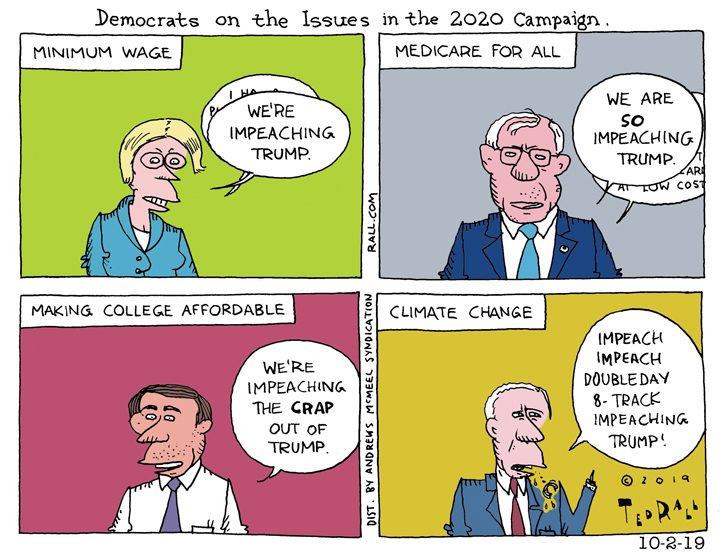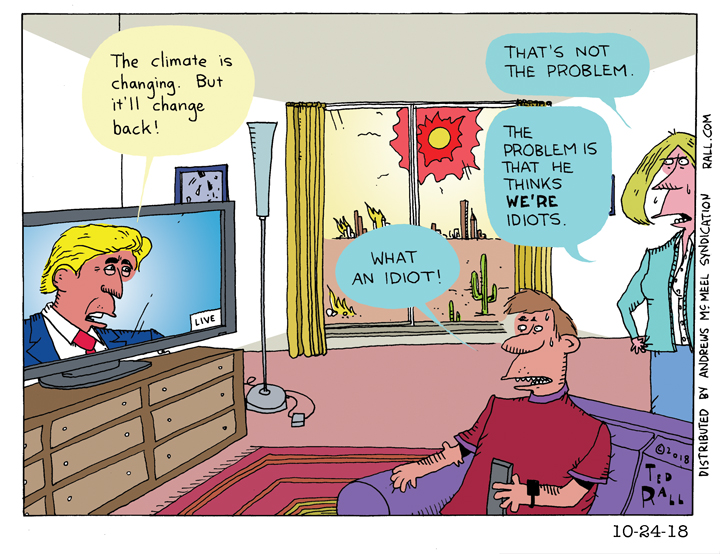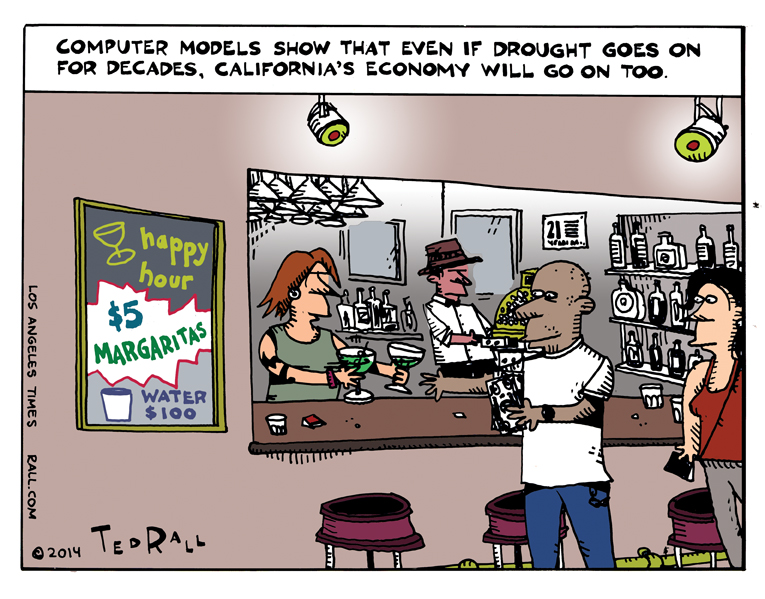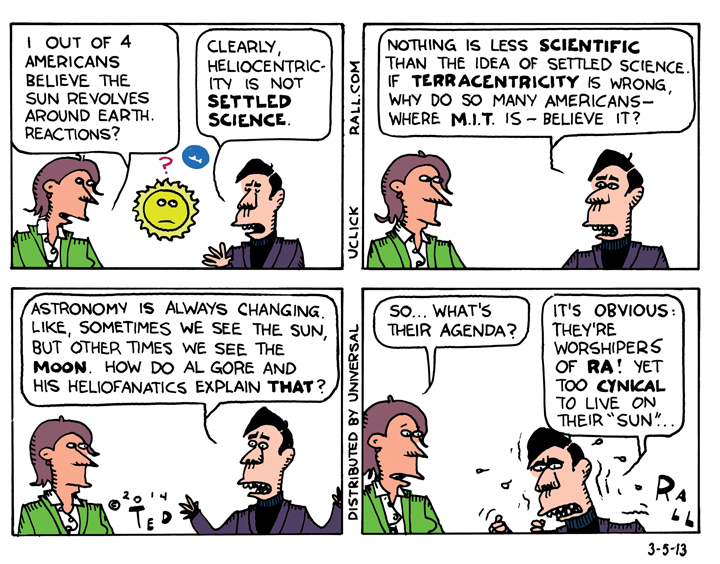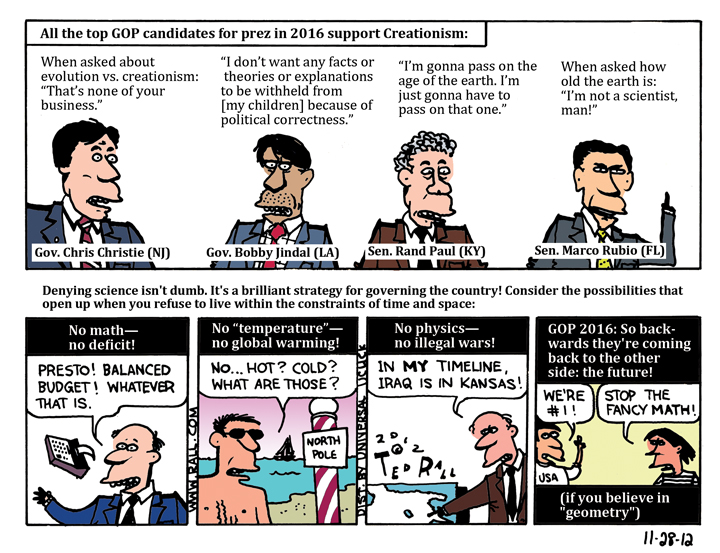Democrats were poised to wage a substantial campaign based on the issues against Donald Trump next year. The likely front runner at this point, Elizabeth Warren, has a plan for everything. These are issues that most working Americans care about, like the minimum wage and healthcare. But now that they’ve decided to impeach Trump, the odds of those issues getting any serious play have all but evaporated.
Left, Center and Right: We’re All in Denial About Climate Change
 The political left, center and right do share something in common in today’s polarized America: we’re all in denial. The first step in 12-step programs begins with admitting that you have a problem for a reason: you can’t tackle a challenge whose existence you refuse to acknowledge. “From a psychoanalytical viewpoint, denial is a pathological, ineffective defense mechanism,” doctors M.S. Vos and J.C. de Haes observed in their 2006 study of cancer patients. A stunning 47% of the patients they polled denied that they had cancer! Denial reduced their chances of seeking treatment and then following through.
The political left, center and right do share something in common in today’s polarized America: we’re all in denial. The first step in 12-step programs begins with admitting that you have a problem for a reason: you can’t tackle a challenge whose existence you refuse to acknowledge. “From a psychoanalytical viewpoint, denial is a pathological, ineffective defense mechanism,” doctors M.S. Vos and J.C. de Haes observed in their 2006 study of cancer patients. A stunning 47% of the patients they polled denied that they had cancer! Denial reduced their chances of seeking treatment and then following through.
“On the other hand,” Vos and de Haes observed, “according to the stress and coping model, denial can be seen as an adaptive strategy to protect against overwhelming events and feelings.” Denial lets you feel better.
We think of climate change denial as a right-wing phenomenon. Indeed, only 56% of Republicans accept the scientific consensus that the earth is heating up; fewer still believe that humans are responsible, compared to 92% of Democrats who agree with scientists.
Those who deny that climate change is real are engaging in what psychologists call “simple denial.” But those on the left aren’t much better. Liberals who think global warming is real often resort to “transference denial”: they blame the right and corporate polluters even though we’re all responsible. The scale of the climate crisis and the level of sacrifice and disruption that would be necessary to mitigate it feels overwhelming. A widely-reported analysis predicted that human civilization will collapse in 30 years. Others say it’s already too late to save ourselves.
“We’re doomed,” predicts Mayer Hillman, a senior fellow emeritus at University of Westminster’s Policy Studies Institute. “The outcome is death, and it’s the end of most life on the planet because we’re so dependent on the burning of fossil fuels. There are no means of reversing the process which is melting the polar ice caps. And very few appear to be prepared to say so.”
He’s probably right.
Bernie Sanders recently proposed the most ambitious assault on greenhouse gas emissions ever floated in U.S. politics, a $16.3 trillion plan to transition out of carbon-based fuels by 2050. By that time, though, we’ll be dead.
As aggressive as Sanders’ plan is, it doesn’t go nearly far enough or fast enough. Yet Republicans and some Democrats say it’s too expensive. No one in corporate media is taking Sanders’ idea seriously. It’s stillborn.
Liberals post their concern to social media. Some even attend protest marches. But they’re hardly acting like we face an existential crisis.
The 16-year-old Swedish climate activist Greta Thunberg told world leaders: “I don’t want you to be hopeful, I want you to panic. I want you to feel the fear I feel every day and then I want you to act.”
Panic? Our “leaders” don’t give a crap. They’re too bought and too stupid to act.
The bird population in the U.S. has collapsed by 29%—a total of 2.9 billion fewer birds—over the last 50 years. During that same period we lost half the world’s fish. Insects are on the way out too. “No insects equals no food, [which] equals no people,” says Dino Martins, an entomologist at Kenya’s Mpala Research Centre.
None of this should come as a surprise. We were warned. “The oceans are in danger of dying,” Jacques Cousteau said in 1970. Life in the oceans had diminished by 40 percent in the previous 20 years.
If you really believe that the planet is becoming uninhabitable, if you think you are about to die, you don’t march peacefully through the streets holding signs and chanting slogans begging the corrupt scoundrels who haven’t done a damn thing for decades to wake up and do something. You identify the politicians and corporate leaders who are killing us, you track them down and you use whatever force is necessary to make them stop. Nothing less than regime change stands a chance of doing the job.
Nothing else—the struggle for income equality, gun control, abortion—matters as much as attacking pollution and climate change.
Anything short of revolution and the abolition of consumer capitalism is “minimizational denial“: admitting the problem while downplaying its severity. Anything short of a radical retooling of the global political system that establishes state control of the economy with environmental impact as our first, second and third priorities is a waste of time that dooms the human race to extinction.
There is no middle ground, no splitting the difference, no compromise. “Good enough” isn’t good enough. Mere progress won’t cut it. Human survival is a pass-fail class. The final exam is tomorrow morning—early tomorrow morning.
Time to get serious, godammit.
(Ted Rall (Twitter: @tedrall), the political cartoonist, columnist and graphic novelist, is the author of “Francis: The People’s Pope.” You can support Ted’s hard-hitting political cartoons and columns and see his work first by sponsoring his work on Patreon.)
Here is Exactly Why Congress Won’t Act on Gun Violence, Climate Change, Impeaching Trump or Anything Else
 I’m from Dayton so I’m thinking about this today: Why hasn’t Congress done anything to address our national epidemic of mass shootings, namely reviving the assault weapons ban? People—Democrats and not a few Republicans—ask me that all the time. I bet all left-leaning pundits get that question.
I’m from Dayton so I’m thinking about this today: Why hasn’t Congress done anything to address our national epidemic of mass shootings, namely reviving the assault weapons ban? People—Democrats and not a few Republicans—ask me that all the time. I bet all left-leaning pundits get that question.
The answer is simple. But it’s not something most people want to hear. It’s the same answer I give to another question I get a lot: why hasn’t Trump been impeached?
Congress hasn’t gotten off its collective pasty lobbyist-fattened ass because the streets of every major city are not currently filled with millions of pissed-off people throwing rocks at store windows and who refuse to go home until Congress passes real gun control.
Democratic voters want Trump impeached. They want it—lackadaisically. They don’t want him impeached so badly that millions of demonstrators are willing to fill the streets of every major city day after day, night after night, turning over police cars and setting stuff on fire, until Nancy Pelosi begins impeachment hearings.
This is a fun game! You name an issue lots of people care about. I’ll explain why the political class is ignoring it.
For example: What with experts predicting imminent human extinction, 98% of Americans are worried about climate change. (Who are the 2%? Happy to die but too lazy to commit suicide?) So why isn’t the U.S. government doing anything about it? Because—yes, you’ve got it now—the streets of America’s major cities are not choked by millions of citizens up for breaking things and fighting back the cops 24-7 until the politicians do something to increase humanity’s odds of survival.
You may disagree with my answers on the grounds that breaking windows is mean to storeowners, that burning things generates toxic gases, that cops are scary or that it’s more fun to sit home watching TV or playing video games than to run around in the streets dodging tear gas. You can rightly point out that the United States has no organized left-wing political group, much less one on the grassroots level, capable of organizing a mass street movement. You can, even more rightly, point out that we shouldn’t have to take to the streets because it’s Congress’ goddamn job to fix the environment and get rid of our insane president and ban the sale of military-grade guns to inbred derps.
What you cannot argue is that I am wrong.
It is an irrefutable incontrovertible fact that, when the nation’s cities are clogged with millions of angry Americans demanding radical change day after night after day after night, who break stuff and refuse to disperse and fight back against the cops and are willing to get beaten up and sometimes killed for their cause, and it’s impossible to carry on business as usual, our worthless public officials will yield to their demands and do what’s right.
Until then, mass shooters will continue to terrorize our public spaces, SUVs will belch greenhouse gases and Trump will tweet crazy racist BS. Bad things happen because good people don’t force them to stop.
Wishing out loud for other people, like Congress, to do something is worse than worthless. It’s damaging. You’re abdicating your responsibility to act. If you trust in “leaders” whose history shows they can’t be trusted, you’re committing political suicide.
(Ted Rall (Twitter: @tedrall), the political cartoonist, columnist and graphic novelist, is the author of “Francis: The People’s Pope.” You can support Ted’s hard-hitting political cartoons and columns and see his work first by sponsoring his work on Patreon.)
SYNDICATED COLUMN: Donald Trump’s Other Lies: His Campaign Promises

This week’s political coverage — probably next week’s too — will likely be dominated by deposed FBI director James Comey’s incendiary testimony before the Senate Intelligence Committee. However, Trump’s “lies, pure and simple” are limited neither to the president’s claim that Comey’s FBI was “in disarray, that it was poorly led” nor his litany of falsehoods — most recently, that the mayor of London doesn’t care about terrorism and that Trump’s First 100 Days were the most productive of any president in history.
Comey’s lucid, Hemingway-tight testimony feels like the beginning of the end for this administration. Anything could happen, of course. But it feels overly optimistic to imagine this circus lasting another year.
If and when the obituary for Trump’s political career is written, his admirers will record his historic, meteoric rise. Indeed, Donald Trump was the most effective presidential campaigner of my lifetime: repeated what lines worked, ditched the ones that didn’t, mastered social media, ignored outdated dogma, tapped into voters’ long-ignored resentments, nailed the electoral college map, and did it all for pennies on the Hillary Clinton donor dollar.
True, the brilliant campaigner can’t govern. But that’s a story for another time.
His critics’ postmortems will emphasize that Trump’s brightly burning campaign rallies were fueled by lies: Obama was Muslim, Obama wasn’t born here, global warming is a Chinese hoax, illegal immigrants are streaming across the border (years ago they were, no longer), police officers are the real victims (as opposed to the numerous black men they shoot).
These lies are scandalous. They ought to be remembered. But we shouldn’t let them overshadow Trump’s biggest lie of all: that he would be different, outside the ideological box of the two parties.
“Trump meets the textbook definition of an ideological moderate,” Doug Ahler and David Broockman wrote in the Washington Post last December. “Trump has the exact ‘moderate’ qualities that many pundits and political reformers yearn for in politicians: Many of Trump’s positions spurn party orthodoxy, yet are popular among voters. And like most voters — but unlike most party politicians — his positions don’t consistently hew to a familiar left-right philosophy.”
Trump promised a hodgepodge ideology, a “pick one from column D, pick one from column R” Chinese menu that appealed to many voters whose own values don’t neatly adhere to either major party platform. Who cares about doctrine? Let’s do what works.
As president, however, that turned out to be a lie.
Trump has governed to the far right. In fact, on just about every issue you can think of, Donald Trump has governed as the most extreme far-right politician of our lifetimes, and possibly in the history of the Republican Party.
Candidate Trump criticized North Carolina’s “bathroom law” and said Caitlyn Jenner could use whichever bathroom she wanted in Trump Tower. President Trump rescinded the right of transgender students to use the school restroom of their choice.
Flip, flop, from somewhat to right-wing conservative, over and over and over again.
Candidate Trump lit up the GOP (and relieved not a few Democrats) by criticizing the stupid Iraq War and promising to put America First. President Trump’s cabinet of generals is bombing the crap out of Syria and asking Congress for a 10% increase in Pentagon spending.
Candidate Trump was all over the place on abortion rights. President Trump is trying to defund Planned Parenthood and appointed Supreme Court justice Neil Gorsuch, a right-wing extremist who will likely cast the decisive vote against Roe v. Wade.
Candidate Trump promised bigger, better and cheaper healthcare for all Americans. Trumpcare will leave tens of millions of patients with no insurance whatsoever.
He even welched on his most controversial promise: to improve relations with Russia. Within a few months, he allowed that U.S.-Russian relations “may be at an all-time low.”
“Trumpism was never a coherent worldview, much less a moral code that anchors the president,” Graham Vyse wrote in The New Republic.
#Wrong!
Trumpism is extremely coherent and consistently extremist. Donald Trump turns out to be Ronald Reagan times ten, minus charm.
(Ted Rall (Twitter: @tedrall) is author of “Trump: A Graphic Biography,” an examination of the life of the Republican presidential nominee in comics form. You can support Ted’s hard-hitting political cartoons and columns and see his work first by sponsoring his work on Patreon.)
LOS ANGELES TIMES CARTOON: Drought Goes On, California Goes On Too
Some “deep green” environmentalists believe that the tab for two-plus centuries of industrialization is about to come due in the form of a catastrophic ecological disaster — one that might lead to the great sixth mass extinction on a scale similar to the meteor believed to have taken out the dinosaurs. (Yes, that means you, human reader.)
Here in California, the current drought — which some scientists believe may be the worst in 500 years — understandably leaves many Golden State residents, always aware of water restrictions in a region surrounded by deserts, with a sense of disquiet. What if this goes on? Will the California Dream turn to dust and blow away?
Apparently not. Like the Earth in general, California’s climate is surprisingly resilient, according to recent computer models.
State climate researchers ran a projection of what would happen after “even decades of unrelenting mega-drought similar to those that dried out the state in past millennia,” reports Bettina Boxall of the Times.
“The results were surprising,” Jay Lund of UC Davis told her.
If you own stock in the ag business, you might want to consider unloading them. Agriculture, the climatologists found, would be hit hard. “In their computer simulation, annual runoff into rivers and reservoirs amounted to only about half the historical average. Most reservoirs never filled. Under that scenario, experts say, irrigated farm acreage would plunge…The state’s 8 million acres of irrigated cropland could fall by as much as half, predicted Daniel Sumner, director of the University of California Agricultural Issues Center. Farmers would largely abandon relatively low-value crops such as cotton and alfalfa and use their reduced water supplies to keep growing the most profitable fruits, nuts and vegetables. They would let fields revert to scrub or dry-farm them with wheat and other crops that predominated before California’s massive federal irrigation project transformed the face of the Central Valley in the mid-20th century.”
Biodiversity would suffer too. “Aquatic ecosystems would suffer, with some struggling salmon runs fading out of existence.”
Water prices will rise. Desalination plants will be built along the coast. While initially painful, the agrishock would only affect 4% of the state’s economy — notable, but not fatal.
Bottom line: “The California economy would not collapse. The state would not shrivel into a giant, abandoned dust bowl. Agriculture would shrink but by no means disappear.”
Paradoxically, this good news (or not-that-bad news, anyway) is bad news.
Political and economic leaders tend to ignore problems before they turn into a crisis — especially when heading off the issue would cost money. The news that California’s drought probably won’t lead to ruin within their lifetimes, or our children’s lifetimes, ensures that they’ll keep ignoring environmental destruction. Species will keep going extinct. Flocks of birds will continue to thin out. Invasive species will accelerate the process. These things may not sink the Dow Jones Industrial Average, but they really really really suck.
This is one of those rare times when I wish — almost — that the scientists had lied about what they discovered.
SYNDICATED COLUMN: Obama’s Governus Interruptus

Obama is a Uniquely Lazy, Ignorant, Weird President Who Has Done More to Undermine Faith in American Democracy Than We Could Have Imagined In Our Worst Nightmare
Obama will go down in history as a unique president. Because he’s black*, obviously.
Also because he’s a uniquely weird guy: a politician who knows nothing about politics — and doesn’t seem interested in figuring it out. Even while his presidency is in crisis, he’s so obliviously impassively oblivious you have to wonder if he’s living in the same dimension as the rest of us.
Officially (Dow Jones Industrial Average, rich people’s incomes, the fake unemployment and inflation figures issued by the Bureau of Labor Statistics), the economy is recovering. Officially, the wars are ending. (“On the ground” in Iraq and Afghanistan, not so much.) Yet Obama’s approval ratings are plunging, even lower than other recent two-term presidents at the same point in time — including the vile, insipid, illegitimate usurper Bush.
No wonder: Obama’s messaging is lousy. John McCain, a zillion years older than the president he lost to and operating with a brain damaged under torture, can see it — so why can’t Obama?
That’s what McCain was wondering aloud after a panel convened to advise Obama about the NSA issued its report: “Most presidents would have now given a speech and said, ‘OK, here’s what the recommendations are; here’s what I think we ought to do.’ Instead, it just came out.” Like a wet turd. “There’s not a translation of facts and events to remedies that the president supports.” How hard is it to tell the panel to submit their ideas to him first so he can repackage the ones he agrees with as his own? That’s Management 101.
Obama is ignorant. Doesn’t have a clue what his minions are up to. Which is bad. Obama’s ignorance is devastating because he lets us know that he doesn’t know. Reagan only read single-page memos, and though Americans suspected he was daft, they didn’t know. It makes a difference.
Chiming in from the even-a-right-winger-who-loved-Bush-can-be-right-twice-a-year corner of The Washington Post op-ed page, Charles Krauthammer marvels: “With alarming regularity, [Obama] professes obliviousness to the workings of his own government. He claims, for example, to have known nothing about the IRS targeting scandal, the AP phone records scandal, the NSA tapping of Angela Merkel. And had not a clue that the centerpiece of his signature legislative achievement — the online Obamacare exchange, three years in the making — would fail catastrophically upon launch. Or that Obamacare would cause millions of Americans to lose their private health plans.”
Dude went to Columbia and Harvard. He seems smart. What’s wrong with him? Is he — as his former colleagues at the University of Chicago, who noticed that he never published — lazy? He’s certainly a far cry from the LBJ who, according to his biographer Robert Caro, routinely burned the midnight oil committing every sentence of every bill, ever, to memory.
Obviously, a president who finds time to watch sports, play golf and kick off for vacations for weeks at a time — while the global economy is melting down — hell, while his signature legislative accomplishment, Obamacare has all but completely imploded — is lazy as all get up. Still, there’s nothing new about presidential sloth. Reagan, Clinton and Bush all worked less than the average minimum-wage worker whose misery they were steadfastly ignoring.
Obama is unique, though. It goes beyond laziness. He doesn’t follow tried and true practices of presidential governance that have served his predecessors for more than two centuries. Intentional? Who knows? It seems more than likely that (and this is so outlandish that I’ve literally waited years to write these words) he is so ignorant of history that he doesn’t know why and how previous presidents have failed and succeeded. Because, let’s face it, if this is three-dimensional chess, he’s down three queens.
The most blinding example of Obama’s ignorance of/unwillingness to/disdain for the act of governing/politicking is what I call Governus Interruptus — delivering a major speech on a problem, then failing to follow up with a policy initiative (a bill, say).
“President Obama’s speeches…are often thoughtful, nuanced, highly evocative, and exceptionally well-delivered — and worse than inconsequential,” Amitai Etzioni writes in The Atlantic. “They raise expectations — a world without nukes! Ending global warming! Finally curbing gun violence! — but are not followed by much of anything. These barren speeches are one reason the public, and especially the young, are becoming disaffected from politics, bad news for any democracy.”
Speaking of LBJ: When he announced “a national war on poverty” with one objective — “total victory” — to lift up the people “who have not shared in the abundance which has been granted to most of us, and on whom the gates of opportunity have been closed” — he didn’t leave it at that. Food stamps, Head Start and other anti-poverty programs followed…laws that began as bills. Bills drafted by the White House and proposed to Congress, which the president strong-armed into passing.
Where is Obama’s nuclear disarmament bill? Why hasn’t he convened a global summit to address the environmental emergency, with the U.S. leading the way with dramatic initiatives to reduce greenhouse gases? Where is his gun control proposal?
Obama jawboned his way into the White House. Evidently Obama hasn’t read enough to know that talking isn’t governing.
Either that, or he doesn’t care.
(Support independent journalism and political commentary. Subscribe to Ted Rall at Beacon.)
COPYRIGHT 2013 TED RALL

